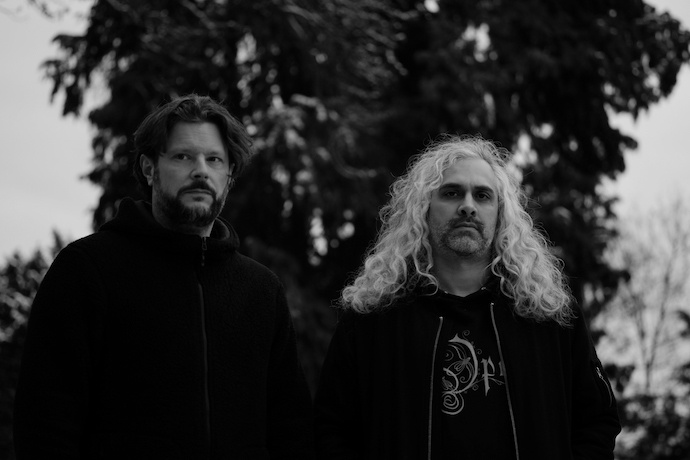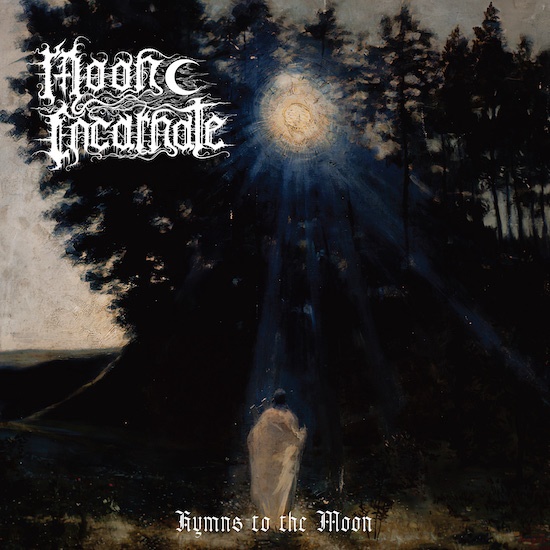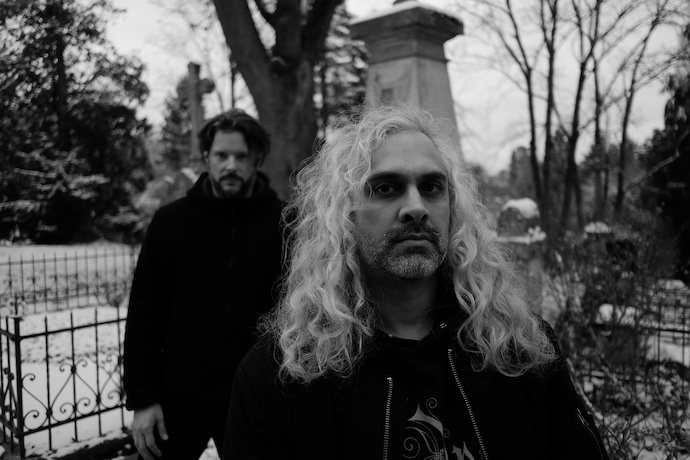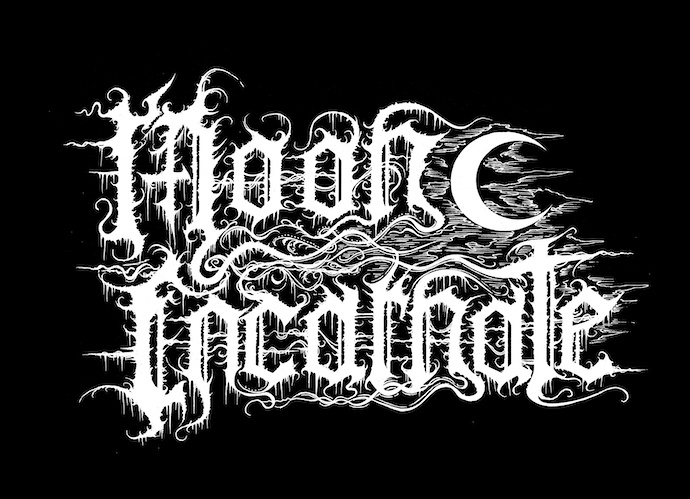
(Today we present Comrade Aleks‘ excellent discussion with Christian Kolff and Matin Vasari, with the focus being on their band Moon Incarnate, whose debut album was released earlier this year by Iron Bonehead Productions.)
The death-doom coalition Moon Incarnate was created by experienced members of the German underground: Christian Kolff (guitar, bass, synths), the leader of the prog death-doom act Valborg and five other projects of different directions, as well as Matin Vasari (vocals, synths) from the death metal band Beyondition.
Hymns to the Moon is seven small fantasies on the theme of death-doom of the ’90s, the fruit of love for the legacy of The British Three, Tiamat, Katatonia, Samael, as well and others like them.
Album opener “Hymn to the Moon” is an interlude with textbook riffs, soft keyboard backing, and solemn, otherworldly recitation. ‘The Tempest’ is closer to exhausting death-doom, although there is some kind of experimental abnormality in it. The vocals are presented with declamation and basement growls, but overall, this chthonic theme is underwhelming.
More intriguing is the battle march “A Knight’s Death”: it is straightforward, even rude, embellished only by the short presence of the choir. In some ways this monotonous track is atmospheric, but it is not rich in melodies, although their absence is compensated by the authentic gothic doom line of “Nemesis”. At first, we are treated to a bunch of riffs and growls, but then clean vocals come in and Lovecraft’s lines are heard under a weightless guitar melody. High poetry and its fascinating presentation adorn the track.
Likewise, the mournful “A Graveyard in My Soul” is decorated with quotes from Bram Stoker, and here it must be said that almost all the lyrics of Hymns to the Moon are borrowed from the works of poets of bygone eras. We will hear poems by the British traveller Mary Wortley-Montagu (1689 – 1762), the American writer James T. Fields (1817 – 1881), Dante Alighieri himself (1256 – 1321), and Alfred Tennyson (1809 – 1892). The band completes the album with the neatly dramatized “Minotaur” and the rocking “Kraken”, and they are very good.
The album is not smooth, but it is original enough to recommend it to doom fans and it leaves some questions unanswered even after a few listens. That’s why I welcome you to read this interview with Moon Incarnate’s Christian and Matin.

Hi Christian! How are you? What are you occupied with now?
Christian: Hello, everything is fine so far. I’m just starting the day. The window is open, I can hear a lawnmower and church bells in the background.
Well, I wanted to start with Moon Incarnate’s release Hymns to the Moon, which saw the light of day in March, and honestly, I don’t know how I managed to skip it back then. Do you still reflect on this album, or did you switch to some other of your projects?
Christian: I’m not thinking too much about the album at the moment. But I look forward to listening to it again with a lot of distance and remembering the special time when we recorded it. We had so many cool recording sessions. Every few months, from Friday to Sunday. Always good food, stupid laughter, cool conversations, endless summer days, photo sessions in the snowy cemetery, metal magick par excellence.
However, how did you manage to start the band with Matin Vasari? What was your main goal?
Christian: We were hanging out at Matin’s place in May 2021, and we were listening to the first Old Man’s Child. I remembered my teenage bedroom and I had strong feelings about it. I went home and wrote “Minotaur”, and I got this idea of making the Doom Gothic music that I imagined as a teenager. In the early/mid ’90s I was really into the Peaceville bands. At that time, writing the music for Moon Incarnate was also a safe place for me. It felt super cosy and I was very inspired. It all came easy to me.
I see the difference, but you know… You play doom with both Owl and Valborg, what couldn’t you express through these bands that you needed to start another one? How would you describe the spirit or the core ideas of each band?
Christian: Moon Incarnate is old-school and works with two guitars. For me it’s about recreating an old feeling in a way that it is cool. Not in a wistful nostalgic way. And it is a project that I do together with Matin. And when I write for Moon Incarnate, until now, it was always in a mindset that I want to go to a safe place and to express a warm melancholy with guitars.
Doom Gothic from the early ’90s was beautiful in its melodies. The weeping guitars, the choirs, the heavy riffs, the clean pickings, the poetic lyrics, the images and so on. The music nowadays, for example current Black Metal, there is a lot which is very bleak, dissonant and brutal. I like to listen to that music too, but I can say, that it is clearly not beautiful, and it makes me feel depressed. Whereas with Moon Incarnate I feel epicness, or beautiful sadness and the power of metal. Which are good feelings.
Valborg has developed into its own thing over the years, as a trio and with German vocals. I also write with my bandmates in mind and the abilities we have and how we sound live. We are a live band and Valborg‘s goal is always to be a little different than before. And to draw inspiration from non-musical areas. This has always been the case in our 20-year band history.
Owl has a modern doom approach. And Owl is my most personal outlet. There is no filter or no theatre in a sense; the emotions I put into and try to express are always very pure and come from a vulnerable place.
At which stage did Peter Scartabello joined you? Why did you choose to collaborate with him, as he residences in the US?
Christian: We’ve been in contact since the Myspace days. One day I received a message from Peter telling me that we absolutely had to work on a project someday. I told him about Moon Incarnate, sent him the songs, and then it all just happened. Peter sent me the recorded drums a few weeks later. That was so awesome.
I see that there are mentioned such references as the “Peaceville Three” (let’s use UK Three, which is more correct) and a few other doom bands from the early ’90s regarding the album, but all of them had quite different sounds and features from the start. So what kind of qualities did you want to fill your songs with?
Matin: We did not only mention doom bands, but black and death bands as well. I think what drove us in writing this album was the spirit of the bands mentioned in the booklet, not only the style. We wanted to approach everything in a similarly naïve way. Of course this is always just going to be an approximation, because we are not 17 years old in 1993, but at least we tried…
Yes, I saw non-doom references there as well, but I didn’t get the connection. And I don’t get your connection with those “naïve ways”, because, you know, let’s take the UK Three: Anathema and their “Nocturnal Emission” was quite naïve, yes, but MDB and PL worked consciously and more focused as far as I understand (and read). How do you see this “naivety”?
Matin: The connection between the bands we mentioned in the booklet is, first and foremost, the fact that we loved them when we were early teens, between 1992 and about 1995.
When I talk about naïveté, I am not talking about simple song structures or missing musical technicality or bad singing, although some of these aspects one can find on albums of all of them, haha. That is not the point.
For me, being naïve in this context means making music without knowing what would emerge from it in the future with regards to the development of metal and its subgenres. They just wanted to create a certain atmosphere in their early days, because there was no “standard” yet. There were no production standards, no “right” sound, no “right” genre markers.
Unfortunately, now we do have these constraints, but we try our best to free ourselves from it…

It seems that you searched for that “right” old school spirit in your songs, and in addition you used the lyrics of some classic, sometimes “gothic”, authors like Lovecraft, Stoker, Tennyson, and Mary Wortley Montagu among others. How did you pick up suitable poems for your songs? What were your criteria?
Matin: We did indeed look for the old-school spirit, but we mostly can find anything we need in ourselves. I can write my own lyrics, but today I prefer using old poems, because they are often much better than what I would write, and it saves me a lot of time. I think that everything has been done in metal lyrics, so although it might be fun to write some original lyrics occasionally, it is still much more efficient on multiple levels to just use these grand old works. They offer better and more varied vocabulary, and very pleasant meter.
I only used the Stoker line and another quote in “Graveyard in My Soul” because it was so fitting, the rest were original lyrics. The other poems were all chosen based on their suitability for the song. Lady Montagu was a no-brainer, since we wanted to cherish the moon. The rest were just chosen based on their fitting the mood of the songs.
The only completely original lyrics in the album is the text of “A Knight’s Death”, and I need to admit that it’s quite poetic and strong. What’s the story behind this song? Why did you choose the original lyrics for it?
Matin: Thank you, I am quite content with these lyrics. Christian’s neighbour has a rooster who always woke me early with his crowing when we had writing sessions for the album. That reminded me of an early morning battlefield and made me write the lyrics for “A Knight’s Death”.
And for the record: “Graveyard in My Soul”, “Minotaur”, and “The Kraken” are all original lyrics for the most part as well.
Ha-ha! Such a story! However from Christian’s words those sessions were like a vacation. Do you write all of your albums in such way? Do you think that it was necessary to gather together or can you imagine that the next album can be recorded separately?
Christian: For Moon Incarnate, it’s important that we work on it together. The whole thing works like this: I write some material at home, I work on the lyrics, and when we meet we finalise the songs together or write together.
Matin: I always have to meet for making songs. It must feel like teenage times. just hanging around, having fun, smoking and drinking, taking walks to the store or the woods, making music. Finishing the songs separately wouldn’t feel right. For writing riffs or some lyrics it is okay, but for arranging songs or for mixing we have to meet in person. There is no way around it for me.
Only for drums I have always had the drummers recording alone in all my projects, mostly due to the dependence on the drum set logistics. And in this case going to the States was not an option financially anyway. But of course we would prefer recording with Peter face to face, either here or in the States.

Hymns to the Moon is a heterogeneous album, and after a plainly slow, almost monotonous start we have the catchy mid-tempo “Nemesis”, and one of the most efficient tracks “Minotaur” and “Kraken” are placed in the end. How did you shape this material?
Matin: “Minotaur” was the first song Christian sent me as a demo. My wife told me that the riff that is now the chorus sounded like a minotaur approaching. She was right, haha. “Hymn to the Moon”, “The Tempest” and “Minotaur” were the songs that Christian wrote alone. I mean, of course we arranged together, but all the riffs were his.
“Kraken” and “Nemesis” were written by us both together from scratch, although the guitar work is of course Christian’s. I think the only guitar riff written by me is the mid-tempo part in “Graveyard”.
“Nemesis” stands aside from other songs because of its unique gothic touch, and Matin’s clean vocals work perfectly there. But besides that, its lyrics are taken from Lovecraft’s poem with the same title. Did you approach Lovecraftian myths in your other bands? I thought that I heard some references in Owl.
Christian: We’ve done Lovecraft songs in Valborg before, but never with Owl. Usually, other band members have the idea to do a Lovecraft song.
Matin: Jan of Valborg and I are huge Lovecraft fans, so whenever we look for quality work we turn to his works for inspiration or in this case for lyrics. I will certainly use Lovecraft poems in the future again.
Which Valborg songs do you mean? Most of the lyrics are in German, so I really could miss something. And as for Owl… I think that I found the hint in new songs like “A Window in a Strange City” and “Cryptid”. I just wanted to find it there and so I did.
Christian: Valborg songs are “Kryptische Arroganz”, “The Haunted Womb” and “Mortum”. As well as “Krill” from our demo days. And the Owl songs are about a totally different and personal topic.
You released Owl’s new EP Ghosts of Summer in February, but what about Valborg? Do you have some new material in the works?
Christian: We have just recorded two songs with Valborg for a new 7-inch. I’d say we’re more metal than ever again.
Can you tell more about Ghosts of Summer? I like the name, but you went too damn far from the dreamy ways of the Nights in Distortion album.
Christian: After doing the Labyrinth Of Stars project, I’ve become keen to make Death Metal with Owl again. I’ve already had different musical phases with Owl. From Occult Death Metal, to Jesu-like Doom, to the Gothic Nights In Distortion album. Owl became a very personal project from the second album onwards. There were never any grand concepts, I just went with my own feelings, and the lyrics reflect that. Ghosts of Summer was created at the same time as Hymns to the Moon. Whereby Hymns to the Moon represented an escape into a safe place and Ghosts of Summer represented the facing of the brutal reality.
At the time I did Ghosts of Summer, I was very driven to express my feelings. But it was also very gruelling. In a way it was this stereotypical artistic self-torture. But years later you feel a certain pride in doing it. I did it for myself, as a kind of therapy. Ghost of Summer is an album that expresses disconnection, sadness, anger, serotonin deficiency, fear, and isolation. With a longing for connection and community, hence all the session contributions from friends.
What are your plans for the rest of 2024?
Christian: Completing the vocal recordings for the new Labyrinth of Stars album. Maybe the whole album will be finished this year. Let’s see how it goes. The album is hyper-aggressive, and the vocal recordings somehow take a lot of time. I also wrote some material for a second Moon Incarnate album in the first half of the year. At some point Matin and I want to meet up to work on the songs together. Other than that, I’m just trying to take it easy. I haven’t been so busy with music for a few months. That was nice too. But recently I’ve been coming up with ideas again and I feel like recording something.
Thanks for the interview gents, it was my pleasure. Let’s hope that it will help to spread the Word. And do you have something to add in the end?
Christian: Thank you for the interest and the good questions. That’s very flattering. In this day and age, in the oversupply of music, it becomes all the more important to make music for the right reasons. With people you like to hang out with. It’s all about the hang. And if this fits, everything will fit.
Matin: Hails to the Old Ones!
